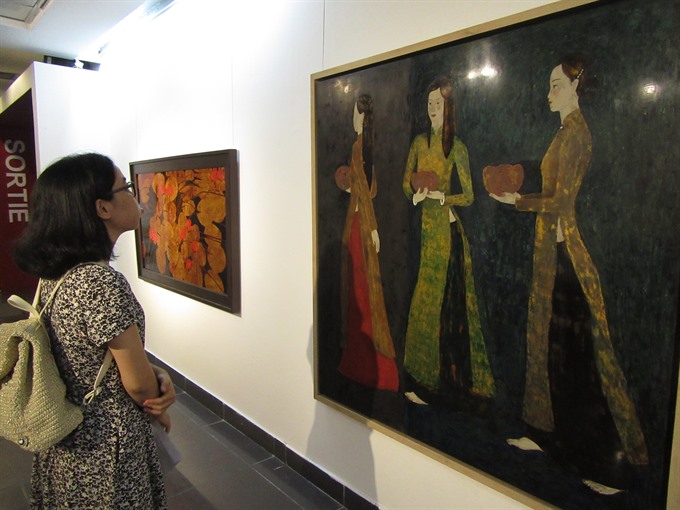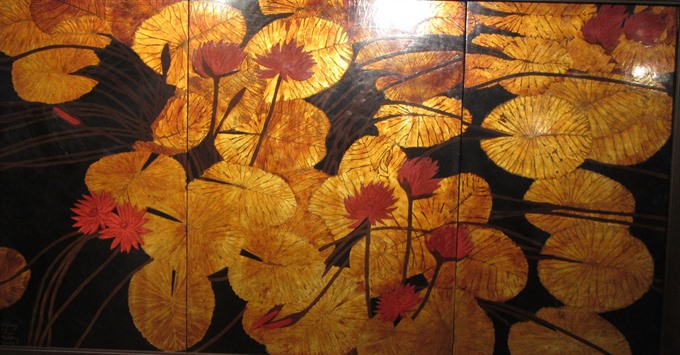Rural Vietnamese landscapes are portrayed in original lacquered paintings at a new exhibition in Hanoi that started yesterday.

A lacquer painting by Nguyen Thi Que features the beauty of wild banana flowers.
The exhibition, entitled Nature-Nostalgia, includes paintings by three artists – Đặng Thu Hương, Lý Trực Sơn, and Nguyễn Thị Quế.
The artists were schoolmates at Việt Nam Fine Arts College in the 1960s, who together explored the ‘oriental’ art of sanded lacquer twenty years ago. The destructive American War brought them closer to nature and inspired them to take on simple subjects: flowers, people, the countryside. The charm of their works resides in the sparkling of the lacquer and its red, black, silver and gold palette.
Through their paintings, the three artists tell the public, in their own way, personal stories about their emotions and love for nature, life, nostalgia, and thoughts on beauty through their lacquer paintings.
Their artworks feature images that are closely attached to memories of their homeland and their youth.
“We want just to convey our emotions, and we hope that audiences can feel those ideas when they see our artworks,” confides artist Sơn at the event’s opening ceremony.
“We hope that Vietnamese artists can contribute to preserve the traditional art of lacquer painting,” he said.

The exhibition honours the beauty of Việt Nam’s countryside, nature and women.
Visitors to the exhibition can admire images of harvest, children playing games, and women in traditional dresses, all are depicted in the 21 artworks.
They can also admire the beauty of flowers, typical to Việt Nam, such as, nenuphars and bananas.
“The artworks in lacquer require thousands of hours of work, as this technique is very difficult. The exceptional works are proof of their passion for this technique,” said
Emmanuel Lebrande, director of l’Espace, where the exhibition is being held.
Hương was born in Lâm Thao district, in the province of Phú Thọ, which is home to a great number of sơn trees. Over many generations, her family has planted sơn trees and used the resin from the trees to make lacquer. She has spent 20 years making lacquer paintings of flowers. At the exhibition she is showcasing artworks made with the two basic colours of traditional lacquer: yellow, and red. The flowers and nature represented in her paintings are cheerful and lively but still show tranquility, reminiscent of old memories.

A lacquer painter by Đặng Thu Hương features the beauty of nenuphars.
Sơn has excelled in various painting materials: oil, watercolours, and dó paper. He even created natural colours from herbs and vegetables for his paintings. While being
faithful to the basic technique of lacquer using traditional colours, he loved being creative and trying out new colours such as turquoise and blue colvert.
Quế loves painting still life flowers. She tries to make tranquil scenes in her paintings and meticulously paints each petal of the lotus flowers as well as each vein of a
banana leaf. She has been compared to an assiduous gardener, always honouring the beauty of the flowers with the language of fine arts.
Lacquer comes from the resin of Sơn trees that grow in the midland province of Phú Thọ. It was initially used to make lacquer wares and to decorate wooden, devotional
ancestral items in temples and pagodas. Since the 1930s it has been applied to paintings and fine art. In the 30s, the artists of Indochina Fine Arts College started using
lacquer, Việt Nam’s traditional material for making handicrafts, as a painting material.
The exhibition will open free to the public until July 23 at L’Espace, the French Cultural Centre, located on 24 Tràng Tiền Street.
VNS